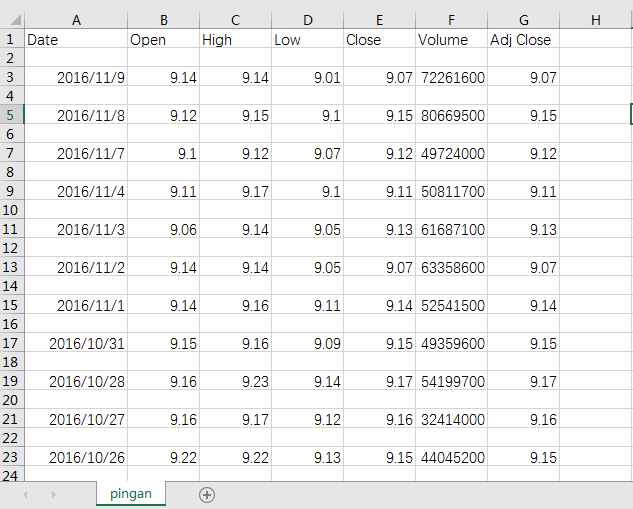主题
数据处理
- csv文件
- json文件
- xml: xpath
- excel
1.
- CSV: 逗号分隔值,其文件以纯文本形式存储表格数据(数字和文本)。
- 模块:csv
- 方法:
csv.reader(), csv.writer(), csv.Dictreader(), csv.writerow(), csv.writerows()
import csv
headers = ['Symbol', 'Price', 'Date', 'Time', 'Change', 'Volume']
rows = [('AA', 39.48, '6/11/2007', '9:36am', -0.18, 181800),
('AIG', 71.38, '6/11/2007', '9:36am', -0.15, 195500),
('AXP', 62.58, '6/11/2007', '9:36am', -0.46, 935000),
]
with open('name.csv', newline="") as f:
f_csv = csv.reader(f)
headers = next(f_csv)
print(headers)
print("=====")
for row in f_csv:
print(row)
print("===")
写入文件形式:
要求:将name.csv文件中Volume的值大于195500的数据写入name_copy.csv文件中.
import codecs
import csv
with codecs.open("name_copy.csv", 'w') as f_name_copy:
f_name_one = csv.writer(f_name_copy)
with codecs.open("name.csv", 'r') as f_name:
f_name_two = csv.reader(f_name)
headers = next(f_name_two)
f_name_one.writerow(headers)
for one in f_name_two:
print(one)
if int(one[5]) > 195500:
f_name_one.writerow(one)
文件显示:
要求:获取雅虎指定股票历史数据,并存入csv文件中.
import requests
import csv
import codecs
response = requests.get('http://table.finance.yahoo.com/table.csv?s=000001.sz')
content = response.text
with codecs.open("pingan.csv", 'w') as f:
content_all = csv.writer(f)
for one in content.split('\n'):
content_all.writerow(one.split(','))
2.
python 如何处理json文件:
- json 模块
dumps(),dump(), loads(),load()方法
import json
import codecs
# json.dumps()
# json.loads()
# json.dump() # 接口是一个文件
# json.load() # 接口是一个文件
one = {"wuhan": 10, "beijing": 1, "changsha": 6}
two = [1, 2, "apple", 'chuizi', {"a": 1, "b": 2}]
one_json = json.dumps(one, separators=[", ", ": "], indent=4)
one_1_json = json.dumps(one, sort_keys=True)
two_json = json.dumps(two, separators=[",", ":"])
print(one_json)
print(one_1_json)
print(two_json)
with codecs.open("one.json", 'w') as f:
json.dump(one, f)
with codecs.open("one.json", 'r') as f:
print(json.load(f))
转换对照表:
| python | json |
|---|---|
| dict | object |
| list,tuple | array |
| str,unicode | string |
| int,long,float | number |
| True | true |
| False | false |
| None | null |
print(json.dumps(None))
print(json.dumps(True))
print(json.dumps(False))
print(json.loads("null"))
print(json.loads("true"))
print(json.loads("false"))
# with codecs.open("one.json", 'w') as f:
# json.dump(one, f)
with codecs.open("one.json", 'r') as f:
print(json.load(f))
res = requests.get("http://www.weather.com.cn/data/cityinfo/101010100.html")
with codecs.open("weather.json", 'w', encoding="utf8") as f_wea:
json.dump(res.text, f_wea)
with codecs.open("weather.json", 'r') as f_wea_r:
A = json.load(f_wea_r)
print(A)
3.
xpath语法:
| Syntax | Meaning |
|---|---|
| tag | Selects all child elements with the given tag. |
| * | Selects all child elements. |
| . | Selects the current node. |
| // | Selects all subelements, on all levels beneath the current element. |
| .. | Selects the parent element. |
| [@atrrib] | Selects all elements that have the given attribute. |
| [@atrrib='value'] | Selects all elements for which the given attribute has the given value. |
| [tag] | Selects all elements that have a child named tag. |
| [tag="text"] | Selects all elements that have a child named tag whose complete text content, including descendants, equals the given text. |
| [position] | Selects all elements that are located at the given position. |
from xml.etree.ElementTree import parse
import requests
import codecs
tree = parse("html.xml")
root = tree.getroot()
print(root.tag)
print(root.attrib)
for child in root:
print(child.tag, child.attrib)
# tag: 查找给定标签的子节点
print(root.findall('country'))
# *:查找所有子节点
print(root.findall("*"))
# . : 查找当前节点
print(root.findall("."))
# // :所有子孙节点
print(root.findall('.//'))
# .. : 父节点
print(root.findall('.//rank/..'))
# [@atrrib] :带有这个属性值的元素
print(root.findall('.//country[@name]'))
# [@atrrib=“value”]
print(root.findall('.//country[@name="Liechtenstein"]'))
# [tag] : 带有tag子节点的节点
print(root.findall('[country]'))
4.
- 模块: xlrd, xlwt
- 功能: 负责读写操作
book.xlsx文件内容和结构:
import xlrd
import xlwt
name = xlrd.open_workbook('book.xlsx')
sheet = name.sheets()
for one in sheet:
print(one.name)
result = name.sheet_by_name('result')
print(result.nrows, result.ncols)
one_one = result.cell(0, 0)
one_two = result.cell(0, 1)
one_three = result.cell(0, 2)
one_four = result.cell(0, 3)
# 1: text 2: number
print(one_one.ctype, one_one.value)
print(one_two.ctype, one_two.value)
print(one_three.ctype, one_three.value)
print(one_four.ctype, one_four.value)
print(result.row(1))
print(result.row_values(1))
print(result.row_values(1, 1))
print(result.col(1))
print(result.col_values(1))
print(result.col_values(1, 1))
result.put_cell(0, result.ncols, xlrd.XL_CELL_TEXT, u"总分", None)
for row in range(1, result.nrows):
t = sum(result.row_values(row, 1))
print(t)
result.put_cell(row, result.ncols, xlrd.XL_CELL_NUMBER, t, None)
wbook = xlwt.Workbook()
wsheet = wbook.add_sheet("Sheet1")
style = xlwt.easyxf("align: vertical center, horizontal center")
value = [["名称", "hadoop编程实战", "hbase编程实战", "lucene编程实战"], ["价格", "52.3", "45", "36"], ["出版社", "机械工业出版社", "人民邮电出版社", "华夏人民出版社"], ["中文版式", "中", "英", "英"]]
for i in range(0, 4):
for j in range(0, len(value[i])):
wsheet.write(i, j, value[i][j], style)
wbook.save("wbook1.xls")
friend = name.sheet_by_index(1)
friend_copy = name.sheet_by_name("friend")
print(friend.nrows, friend.ncols)
print(friend_copy.nrows, friend_copy.ncols)



